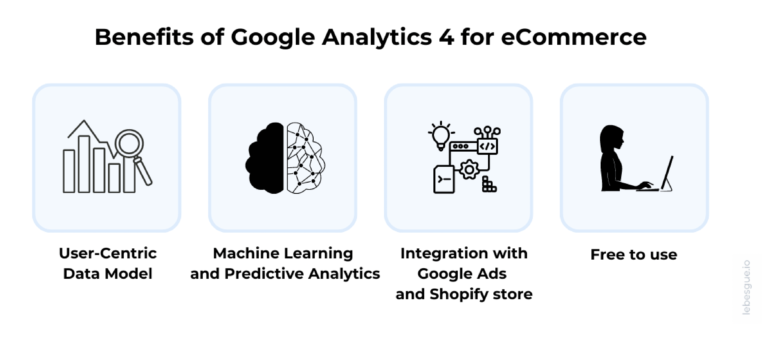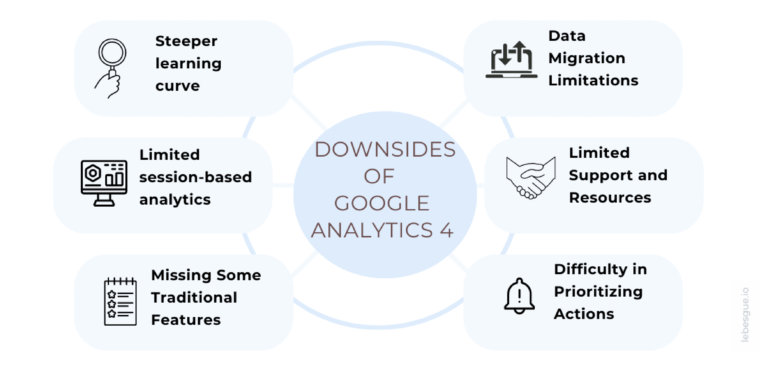Understanding your customers and their journey is key to growing a successful e-commerce business.
Google Analytics 4 (GA4) offers powerful insights that go beyond traditional tracking, helping you measure user behavior, optimize marketing efforts, and drive more sales.
With advanced features like event-based tracking, cross-device reporting, and AI-driven insights, GA4 gives e-commerce store owners the data they need to make smarter decisions.
In this post, we’ll explore the key benefits of GA4 and why it’s essential for your online store.
Why Should You Use Google Analytics 4?
GA4 represents a significant shift in data tracking and analysis capabilities, providing you with more insightful and comprehensive data to drive your e-commerce success.
Furthermore, Google Analytics 4 is not just an update but a complete reimagining of Google Analytics. It’s built on an event-based tracking model that focuses on the actions users take on your site, not just sessions or pageviews.
This shift allows you to understand your customers‘ journey in a more nuanced way.
For instance, if a potential customer visits your Shopify or WooCommerce store, reads a few product descriptions, watches a product video, then leaves without making a purchase, all of these actions are events that GA4 tracks.
So, access to this data helps you optimize your product descriptions, videos, and other touchpoints that lead to conversions.
Benefits of Google Analytics 4 for e-Commerce
But, the main question is what are the benefits of Google Analytics 4 for eCommerce businesses?
For this list, we singled out four main benefits that you have of using Google Analytics 4 for your store. The most important benefits are:
- User-centric data model
- Machine learning and Predictive analytics
- Integration with Google Ads and Shopify store
- Free to use
So, let’s explore each benefit a little more.

User-centric data model
First is the user-centric data model. GA4’s event-based tracking model gives you a granular view of how visitors interact with your e-commerce store.
This data will help you optimize your store layout, product descriptions, and pricing strategies to maximize conversions and increase your return on investment.
Machine learning and predictive analytics
The second one is machine learning and predictive analytics.
One of GA4’s powerful features is its machine learning capabilities. It uses Google’s advanced machine learning models to automatically alert you about significant trends in your data.
For example, if a particular product is getting more attention than others, you can leverage this information to increase its visibility or run a promotional campaign.
Integration with Google Ads and Shopify store
The next benefit is integration. If you’re running Google Ads for your e-commerce store, GA4 offers a more seamless integration.
You can create audiences based on your GA4 data and use these insights to design more targeted and effective ad campaigns.
Furthermore, GA4 easily integrates with Shopify, making it simpler to implement and track the impact of your ad campaigns directly within your e-commerce platform.
Free to use
And last but not least, Google Analytics 4 is free to use. GA4 is not just a powerful tool for e-commerce analytics; it’s also completely free to use.
GA4 offers a robust and cost-effective solution for understanding your users’ journey and making data-driven decisions to enhance their experience and boost conversions.
The Downsides of Google Analytics 4
While GA4 introduces some impressive features, be sure to consider some potential challenges when adopting this new platform. So, some of the downsides of Google Analytics 4 are:
- Steeper learning curve
- Limited session-based analytics
- Missing Some Traditional Features
- Data Migration Limitations
- Limited Support and Resources
- Difficulty in Prioritizing Actions
Like the benefits, let’s explain the downsides of Google Analytics 4.

Steeper learning curve
The first is a steeper learning curve. The transition from Universal Analytics to GA4 might seem challenging due to the new event-based tracking model, which significantly differs from the traditional session-based model in Universal Analytics.
It requires some effort and time to effectively understand and utilize this new model.
Limited session-based analysis
While GA4 provides powerful user-centric analysis, it can fall short when it comes to analyzing user sessions in the context of churn or retention. GA4 primarily focuses on user interactions during individual sessions on your website, which may not give a complete picture of user retention over time.
If you’re looking to conduct an in-depth cohort analysis, lifetime value (LTV) analysis, or retention analysis, you need to supplement GA4 with a dedicated tool like Lebesgue: Marketing & LTV, which is designed for comprehensive retention and LTV analysis.
Missing some traditional features
Some familiar features from Universal Analytics are not present in GA4.
For instance, the ‘bounce rate’ metric, which many marketers heavily relied on, is replaced in GA4 with ‘Engaged Sessions’ – a new way of understanding website engagement.
Data migration limitations
Also, historical data doesn’t automatically migrate from Universal Analytics to GA4, which means GA4 starts collecting data anew from the time of setup.
This might pose some initial challenges in trend analysis as you won’t have access to your historical data within the new platform.
Limited support and resources
Given that GA4 is still relatively new, it has limited support and fewer resources available for troubleshooting than Universal Analytics.
Although Google and other communities, including Lebesgue, are actively creating new materials to assist users, finding immediate solutions to specific issues may be slightly difficult.
Difficulty in prioritizing actions
While GA4 excels in data collection and user-centric analysis, e-commerce merchants may need help to interpret the vast data into actionable steps. Translating data insights into a prioritized plan for your WooCommerce or Shopify store can seem daunting, especially with the multiple tasks involved in running an e-commerce business.
To counter this drawback, Lebesgue offers a suite of three free auditing apps. Designed to streamline your marketing efforts, these apps provide comprehensive audits for your Facebook, Google, and TikTok marketing campaigns.
By offering clear insights and prioritized recommendations, Lebesgue’s apps empower e-commerce merchants to make strategic decisions, enhance their marketing strategies, and ultimately drive more conversions.
By integrating Google Analytics 4 with strategic tools like Lebesgue’s auditing apps, you can unlock a new level of data-driven decision-making for your e-commerce business.
Summing Up
As all marketers like to say, data is king. Storing data properly is a challenge by itself, and analyzing it to drive the right conclusions differentiates average marketers and industry experts. So, getting used to GA4 is a necessary step for every marketer who wants to stay relevant and up-to-date with the latest trends in the industry. We hope that some of our benefits helped you to migrate your Universal Analytics to GA4.
If you still didn’t migrate from Universal to GA4, check out our blog post on how you can do it easily.



